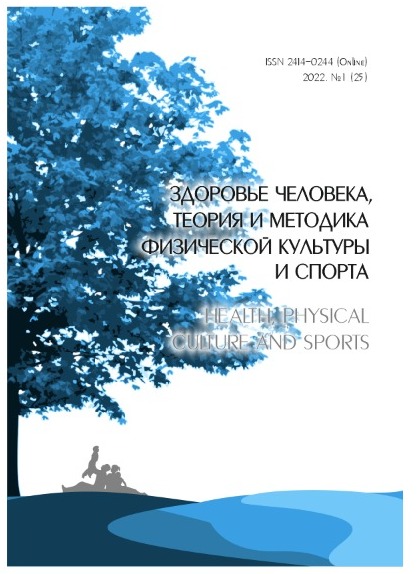Professional sports as a way of connecting with the “significant other” (on the example of the manchester united football club»)
Abstract
The object of the study is the football club “Manchester United”, the history of which is interesting because it clearly shows the process of evolution of a complex socio-economic system that combines sports, show business, industry, ideology and politics at the same time. The aim of the study is to consider the football game as a way of interaction of players and other persons involvedwith the “significant Other”.The methodological basis of the research is the concept of the general organizational science of A.A. Bogdanov, according to which a model of a sports club describing its relationship with the external environment is proposed.The article states that the relationship with the” significant Other “goes through several stages: “pleasant”, “useful”, “noble” and “holy”. These stages correspond to the stages of development of both an individual and associations of people.Professional club “Manchester United” operates today at the level of “Noble”, and its structure consists of several functional levels operating in parallel: political, technological, economic, coaching and physical. It is stated that these levels are connected mainly by information, and the largest part of the connections between them is carried out indirectly-through external actors.It is proved that the sports club, as a socio-economic system, is based on a difference (in the understanding of A. A. Bogdanov), which triggers long-term material, information and energy flows. Each functional level of a sports club works with a specific type of such flow, seeking to close its poles and thereby ensure the strategic viability of the club.
Downloads
References
Гессе Г. Игра в бисер. М. : Правда, 1992. 493 с.
Лебон Г. Психология народов и масс. М. : Академический проект, 2015. 239 с.
Поляков К.Н., Касабов Г.В., Полякова М.В. Оценивание человеческих ресурсов в ходе реализации ресурсной стратегии спортивного клуба // Журнал институциональных исследований, 2017. Т. 9. №2. С. 80–96.
Саливан Г. Интерперсональный психоанализ. СПб., 1999. 347 с.
Хейзинга Й. Homo ludens. Человек играющий. М. : ЭКСМО-Пресс, 2001. 352 с.
Hamil S. Manchester United: the commercial development of a global football brand // International Cases in the Business of Sport. 2008. P. 114–134. DOI: 10.1016/B978-0-7506-8543-6.50014-7.
Hill J., Vincent J. Globalisation and sports branding: the case of Manchester United // International Journal of Sports Marketing and Sponsorship. 2006. Vol. 7(3). P. 61–78.
Horrocks D., McKenna J., Whitehead A., Taylor P., Morley A. Qualitative perspectives on how Manchester United Football Club developed and sustained serial winning // International Journal of Sports Science & Coaching, 2016. Vol. 0(0). P. 1–11. DOI: 10.1177/1747954116655053.
Rosca V. The Strategic Development of the Manchester United Football Club // Economia. Seria Management. 2010. Vol. 13. Iss. 2. P. 478–484.
Tertuliano I., Lima E., Oliveira V., Santana B., Pavlović V., Machado A. Sport management in Emerging Economy: Squad size, Expenses and Results – Case of the Brazilian Football League // Management Journal of Sustainable Business and Management Solutions in Emerging Economies. 2020. Vol. 25. No 1. P. 57–66. DOI: 10.7595/Management.Fon.2019.0003.
Weber R., Brand A., Niemann A., Koch F. Non-elite conceptions of Europe: Europe as reference frame in English football fan discussions // Journal of Contemporary European Research. 2020. P. 1–31. DOI: 10.30950/jcer.v16i3.1089.
Brand A., Niemann A. The UEFA Champions League as Political Myth: Unifying Europe or Alienating the Regular Football Fan? // Mainz Papers on International and European Politics. 2018. No.17: Available at: https://international.politics.uni-mainz.de/mpiep-no-17 (accessed 23.04.2021).
Brand A., Niemann A. ECJ Rulings or Wayne Rooney’s Hair – Issues, Non-Issues and Hidden Issues in Online Football Fan Discourse. // FREE-Working Paper, 2014.
Brigevich A. Regional identity and support for integration: An EU-wide comparison of parochialists, inclusive regionalist, and pseudo-exclusivists // European Union Politics. 2018. Vol. 19(4). P. 639–662. DOI:10.1177/1465116518793708.
Cleland J.A. Racism, Football Fans, and Online Message Boards: How Social Media Has Added a New Dimension to Racist Discourse in English Football // Journal of Sport and Social Issues. 2014. Vol. 38(5). P. 415–431. DOI:10.1177/0193723513499922.
Cleland J.A., Cashmore E. ‘Football fans’ views of racism in British football // International Review for the Sociology of Sport. 2016. Vol. 51(1). P. 7–43. DOI:10.1177/1012690213506585.
Davis L. Football fandom and authenticity: a critical discussion of historical and contemporary perspectives. // Soccer & Society. 2015. Vol. 16(2-3). P. 422–436. DOI:10.1080/14660970.2014.961381.
Deacon D., Schwartz S. Cornish identities and migration: a multi-scalar approach // Global Networks. 2007. Vol. 7(3). P. 208–306 DOI:org/10.1111/j.1471-0374.2007.00170.x
Elliott R. The English Premier League: A Socio-cultural Analysis, London etc.: Taylor and Francis.2017.
Copyright (c) 2022 Health, physical culture and sports

This work is licensed under a Creative Commons Attribution-NonCommercial 4.0 International License.
An author should not normally publish manuscripts describing essentially the same research in multiple journals or publication venues. Such redundant publication is generally considered to constitute unethical publishing behavior, and if discovered may result in a manuscript under consideration being rejected, or a published article being retracted.
Authors of manuscripts reporting on original research should present an accurate account of the work performed, accompanied by an objective discussion of its significance. Underlying data should be represented accurately in the manuscript. The manuscript should contain sufficient detail and references to permit others to replicate the work. The fabrication of results and the making of fraudulent or knowingly inaccurate statements constitute unethical behavior and may be cause for rejection or retraction of a manuscript or published article.





